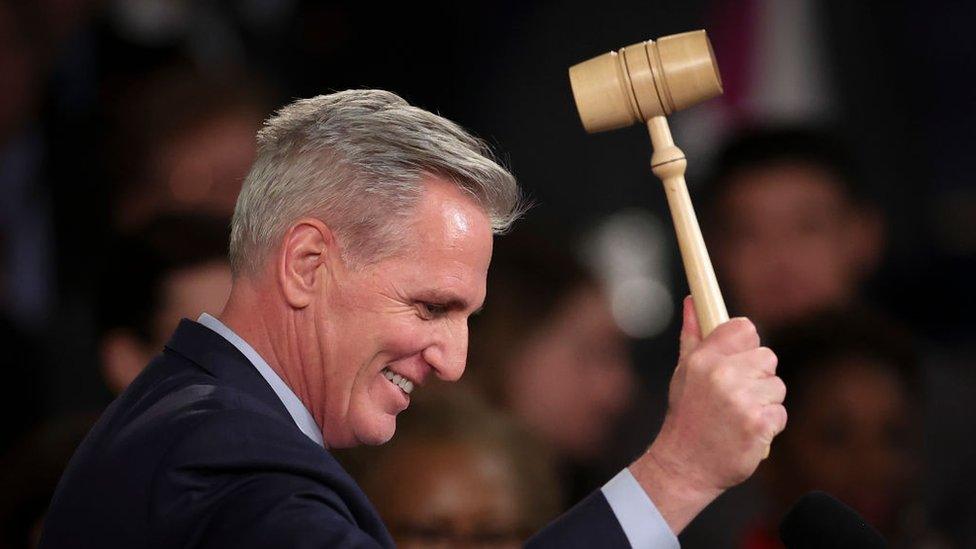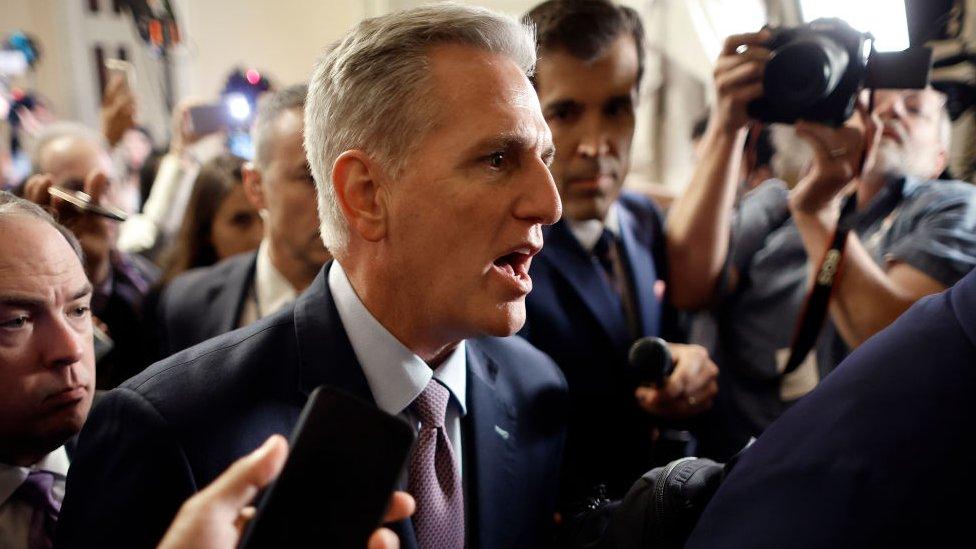What's next for House Republicans?
- Published

It took 15 rounds of votes in a protracted battle not seen since the pre-US Civil War era to elect Republican Kevin McCarthy as Speaker of the House of Representatives this month.
Now control of the chamber of Congress is back in Republicans hands for the first time since 2019.
But electing a speaker - as arduous a task as it turned out to be - may end up being the easy part as they get down to the business of governing, with major fights on the horizon that will test the party's unity.
The shenanigans for electing Mr McCarthy may be over, but his challenges are just beginning as he faces down the White House, a divided Congress and dissent within his own party.
Step one: getting organised
The first step for Mr McCarthy's House is to finish the basic task of getting organised. That includes passing a set of rules for how the chamber will operate. A vote on the rules passed on Monday night.
Several proposals were subject to fierce negotiations between the Republican leadership and the hardcore conservative holdouts who delayed Mr McCarthy's bid to lead the party.
The concessions Mr McCarthy had to make to those members could affect how the House is run. The new Speaker has had to give three spots on the powerful 13-seat Rules Committee - which determines the timing and terms for every major vote in the chamber - to "Freedom Caucus" conservatives who had blocked his ascension. There are also new provisions to allow one member to force a vote on whether to unseat the Speaker and to give longer consideration to bills before a final vote.
The proposed rules changes could affect policy by imposing more stringent constraints on new government spending - it will be harder to pass bills in the House to raise taxes, and to approve defence and social spending.
Then there is an open question as to who House Republicans will pick to chair various committees and subcommittees, in essence determining who calls the shots within the party.
It is not known what promises, if any, Mr McCarthy may have made of giving plum assignments to some of the conservative holdouts - but every promise made could come at a price.
"A lot of promises were made behind closed doors," said Josh Huder, a senior fellow at the Georgetown University Government Affairs Institute. "Every time you give somebody a subcommittee gavel, somebody loses a gavel. It could be a huge, huge mess."

Kevin McCarthy celebrates his win for Speaker
Up next: debt ceiling showdown?
Speaking of huge messes, it appears the House is once again heading for a game of brinksmanship over the government debt limit.
By law, the US government has a cap on the amount of new debt it can issue. As federal budget deficits pile up, Congress has to periodically vote to raise that cap. During the years of the Obama presidency, Republicans threatened to block an increase in the debt limit unless Democrats agreed to spending cuts, with some effectiveness.
With their party back in control of the House, conservative Republicans are once again itching for a fight when the US reaches its debt limit sometime this summer.
And, during their negotiations with Mr McCarthy last week, they won concessions that will make it more difficult for the Speaker to avoid just such a showdown through procedural manoeuvring.
But some more moderate Republicans recoil at risking the solvency of the US government, creating a potential for discord within the party's ranks.
Looming this autumn: budget battles
The simple reality of divided control of Congress is that not much in the way of substantive policy will pass in the next year. Most likely, the legislature will only accomplish what it absolutely has to do.
Raising the debt limit is one obligatory item - the other is approving the funds to run the federal government.
The next budget showdown won't happen until the end of October - the start of the government's 2024 fiscal year, but legislators on both sides of the aisle are already girding for battle.
Conservative Republicans who blocked Mr McCarthy's path to the speakership won promises to make spending-cutting a priority during the upcoming budgeting. As Speaker, he pledged to help Republicans balance the federal budget within ten years and has given them the tools to help pass budget-cutting bills.
But anything House Republicans pass will also have to be approved by the Democratic-controlled Senate, which will not abide by the lower chamber's draconian budget-cutting agenda.
"There's a lot of stuff in these rules that restrict federal spending. How is that going to pass the Senate? It's not," said Mr Huder. "So right off the bat, we have a new process for appropriations that will never come to fruition in terms of law."
That alone could cause frustration among conservative ranks, he said.
And if a compromise can't be reached, an extended partial government shutdown looms in the autumn.
Watch: The unusual moments from a chaotic week in Congress
Democratic saboteurs
Last week proved that the Republicans in the House have a hard time reaching agreement amongst themselves. Now imagine how much more challenging it will be when Democrats in the House, the Senate and the Biden administration are doing everything they can to foment discord within Republican ranks.
The new rules passed Monday night will have the unintended effect of allowing Democrats to more easily force votes on issues - like abortion, healthcare or gun control - that drive divisions between conservative and moderate Republican factions.
And during the high-stakes negotiations over the debt limit and the budget, Democrats may end up negotiating with Republicans in the Senate, then daring House Republicans to block these compromises - all while Mr Biden uses his White House megaphone to paint the conservative holdouts in the House as opponents of bipartisanship.
There is opportunity aplenty, it seems, to expose Republican rifts.
Related topics
- Published7 January 2023

- Published7 January 2023

- Published4 October 2023

- Published6 January 2023

